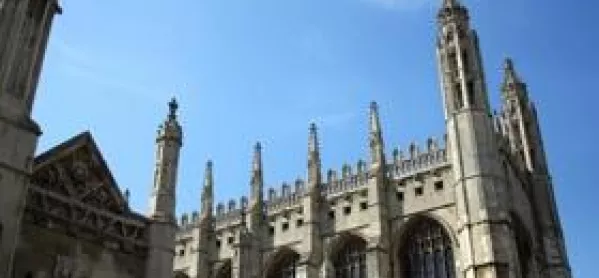Tougher uni offers for IB students - bias claims

Universities are being accused of discriminating against International Baccalaureate (IB) candidates by making them much tougher offers than their A-level counterparts.
Wide disparities have emerged in the Ucas points required for entry to courses at a sample of universities.
Cambridge University expects IB students wanting to study law to achieve final scores judged two-thirds (66 per cent) more demanding than the offers it makes to A-level students.
The differences come according to the points system drawn up by universities admissions service Ucas, which gives values for A-levels and the IB on a common scale. It is designed for use by universities to make “comparisons between applicants with different qualifications”.
But courses at Sheffield, Aberystwyth and Exeter universities and Queen Mary, University of London, are also setting much lower hurdles, in terms of Ucas points, for A-levels than for the IB.
Abigail Aldridge, a pupil at Biddenham International School in Bedfordshire, achieved an IB pass worth 392 Ucas points, the equivalent of more than A*AA at A-level, but she has yet to win a place at university.
“As students we are told that Ucas points are our `currency’ to buy our places at university, and if this is the case then I should be going to Cambridge, Oxford, Harvard or Yale,” she said.
“Instead, I am spending my summer waiting to hear if Queen Mary have a place for me with the possibility of having to go through clearing. Why are universities not recognising how strenuous the IB is and how much it prepares its students for university?”
The IB was championed by the last Labour government, which said it wanted more state schools to offer the qualification.
Education secretary Michael Gove has also praised the IB, for giving pupils “all the characteristics needed to succeed in life”.
All the universities concerned said their offers were not determined by Ucas points, and they looked at other factors such as their own judgment of qualifications’ worth.
But Ian Andain, recently retired head of Broadgreen International School in Liverpool, which has offered the IB since 1992, said: “We feel this is unfair because it is discriminatory. It is a source of frustration for many schools because they feel the nature of the qualification is much harder than A-levels, but pupils still get tougher offers.”
The IB diploma is a larger qualification in terms of study time than three A-levels, requiring more subjects, an extended essay, a study of the theory of knowledge, and community service or a sporting or arts activity.
A spokeswoman for Exeter University said: “We focus on high quality across three A-levels or equivalent and would not accept a lower standard of achievement gained over more qualifications, ie lower grades across four A-levels.”
Fears were raised by parents in Hong Kong two years ago, when some of its schools switched from A-levels to the IB and pupils started receiving university offers equivalent to five A-grade A-levels.
A Ucas spokesman said: “Ucas member institutions set their own admissions policies and entry requirements. Many choose to use tariff points; others do not.” He said the tariff system was being reviewed.
A Cambridge University spokesman said: “The university does not rely on the Ucas tariff, preferring to evaluate each qualification in its own right.”
Offers were based on Cambridge’s “own rigorous research into the levels of performance in public examinations which best predict success at undergraduate level”, he added.
Up to 15 per cent of elite Headmasters’ and Headmistresses’ Conference independent schools use the IB. HMC secretary Geoff Lucas said: “The pressure is felt most at the top end, when some universities offer 42-43 IB points when only something like 0.5 per cent in the world get that figure. Lower down the range, the IB can actually work to their advantage.”
Adrian Kearney, the IB’s Europe director, said: “Given the inconsistencies in some offers that are made, we welcome the tariff review that is currently being undertaken.”
Original headline: Tougher university offers for IB students spark bias claims
Keep reading for just £1 per month
You've reached your limit of free articles this month. Subscribe for £1 per month for three months and get:
- Unlimited access to all Tes magazine content
- Exclusive subscriber-only stories
- Award-winning email newsletters



